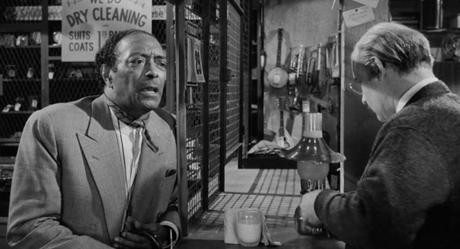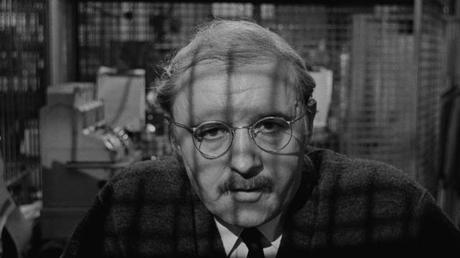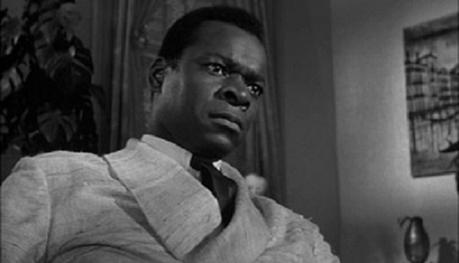Retro Review: 'The Pawnbroker'

The month of February is recognized as Black History Month in the United States. This is to honor the rich history of struggles and triumphs of African Americans throughout history, while also acknowledging the work left to do. In honor of Black History Month I have decided to focus my Retro Reviews on important films of black cinema. With this selection in February's Retro Reviews honoring black history on film I am looking at a movie that seems an unconventional choice but in hindsight many point to it as a landmark flick in black cinema. Legendary director Sidney Lumet forged his deserved reputation as one of the all-time great filmmakers by grounding his pictures in a harsh reality with diverse casts. His filmography kicks off with 12 Angry Men and would be filled with many more of the greatest movie of all-time like; Dog Day Afternoon, The Verdict, Serpico and more. A hidden gem among all of these masterpieces was a 1964 movie that author and film historian Donald Bogle says was one of the forbearers of the "blaxpoitation" movement The Pawnbroker.
After losing his entire family during the Holocaust, former scholar Sol Nazerman lives the cold life of a man willingly cut off from society. Now he is a humble pawn shop owner in East Harlem and though he is adored by his employee Jesus Ortiz, and though he is far from personable he does act as a reluctant mentor to the young man. He experiences firsthand how the people in this largely African-American community live under the thumb of the racketeer Rodriguez. While he initially goes along with the crime boss, Nazerman when he discovers that Rodriguez's crime hustles are eerily reminiscent of the horrors of the Nazis the pawnbroker is forced to make a costly stand.

This film was a star vehicle for Rod Steiger who received the full range of Oscar, BAFTA, and Golden Globe nominations for The Pawnbroker and rightly so as he is incredible. The driving force behind this performance is the rich supporting cast of actors of color his character interacts with throughout the film. Groundbreaking Afro-Hispanic actor Juano Hernandez a veteran of silent and eras of film history has a small but powerful role as a troubled regular customer. The exchange his character, Mr. Smith, has with Nazerman where he tearfully tells the pawnbroker that he simply enjoys their talks is bound to hit any viewer in the heart. An actor who deserved as much acclaim as Steiger received was singer/actor Brock Peters as Rodriguez. As the before-mentioned author of Hollywood Black, Donald Bogle saw it, despite being a black man himself he does not see himself as a potential helper for the rest of his community but as someone who preys on the poor souls of Harlem. He is at once incredibly charming and ruthless as he carries himself with a sense of largess that makes him instantly the most powerful man in any room. With the Pawnbroker, Peters does have the distinction in being in three films of the most powerful and socially relevant films of the decade (the others being To Kill a Mockingbird and The Incident). In one of her few film roles, Thelma Oliver plays a character who at first seems unimportant, but in the end serves as a crucial key in the character evolution of the pawnbroker. These characters along with his employee, Ortiz serve as a means of opening up the closed off pawnbroker. They reveal to Nazerman's racial prejudices he denies to himself forcing him to confront the same horrible mindset within himself that those who destroyed his homeland and family held.

The film caused huge ripples of controversy for Sidney Lumet, but he pressed on because he was passionate about the Pawnbroker. This was one of the first films to challenge the dominance of the censorship opposed on films by the Production Code. Not only did he want to unflinchingly portray the horrors of the Nazis in flashbacks but the film also featured sex, violence, nudity, and even an openly homosexual character none of it was done gratuitously but rather as necessary parts to the story. When the Production Code refused to certify the film, Lumet and the studio pushed to release it anyway paving the way for the future of the movie industry. Lumet was insistent on giving audiences an unapologetic and grounded look at the realities of living in Harlem. It is a gritty community where the African-American and Hispanic residents are kept in the state of poverty hoping for a few extra bucks from a pawn shop owner who treats them with indifference. The fact that an A-lister like Sidney Lumet was able to show this uncompromising and tough perspective of Harlem paved the way for films like Shaft and Sweet Sweetback's Badasssssss Song to follow. Helping immensely in setting the tone for this film was the music composed by the legendary Quincy Jones with his first cinematic score. The song "Soul Bossa Nova" that he composed for the nightclub scene was used again years later as the theme for Austin Powers.
This is a brutal and unforgiving film that once seen will never be forgotten. Rod Steiger was launched into the A-list of Hollywood actors leading a talented and diverse cast. While it may not be the biggest of Sidney Lumet's works it is undoubtedly one of the most important, and the director himself even regarded it as a personal favorite. For the first time countless moviegoers were treated to the unflinching horrors of the Holocaust as well as the harsh realities of living in the American inner-city. Thanks to what the Pawnbroker accomplished a brighter spotlight was shined on African-American culture that would lead to greater representation in film as a whole.

